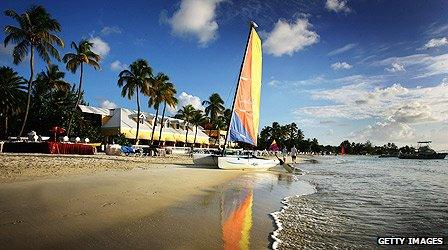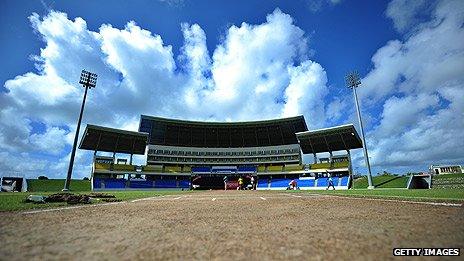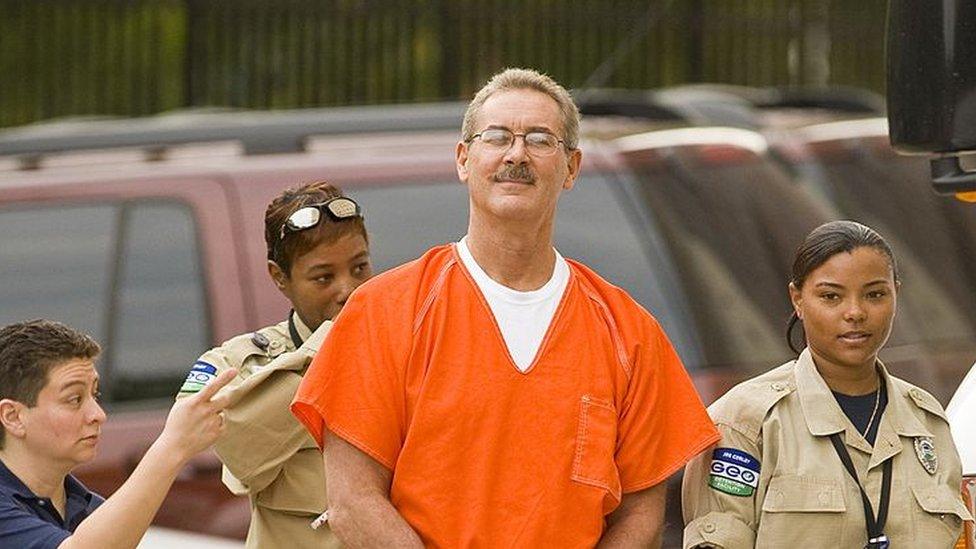Antigua and Barbuda profile - Timeline
- Published
A chronology of key events:
1493 - Christopher Columbus visits Antigua and names it after the Church of Santa Maria de la Antigua in Seville, Spain.

Antigua's beaches are a big tourist draw
1632 - Antigua colonised by English settlers from St Kitts.
British rule
1667 - France formally ends its claim to Antigua in accordance with the Treaty of Breda.
1674 - Christopher Codrington, a sugar planter from Barbados, sets up a sugar plantation in Antigua.
1685 - Codrington leases the island of Barbuda from the British crown; African slaves imported to grow first tobacco and then sugarcane on plantations.
1834 - Slaves of Antigua emancipated.
1860 - Barbuda reverts to the British crown.
1871-1956 - Antigua and Barbuda administered together as part of the Leeward Islands federation.
The Bird era
1946 - Vere Bird forms the Antigua Labour Party (ALP).
1958-62 - Antigua and Barbuda part of the British-sponsored West Indies Federation.
1967 - Antigua and Barbuda become a self-governing state within the British Commonwealth, with Britain retaining control of defence and foreign affairs.
1969 - Barbuda separatist movement comes into being.
1971 - George Walter replaces Vere Bird as prime minister after the Progressive Labour Movement (PLM) beat the ALP in the general elections.
1972 - Sugar industry closed down.
1976 - ALP, led by Bird, returns to power after winning the general election.
Independence
1981 - Antigua and Barbuda becomes independent.
Early 1980s - Attempts made to replant sugarcane fields, but these are finally abandoned in 1985 because of financial problems.
1983 - Antigua and Barbuda supports the US invasion of Grenada (as it has supported US sanctions against Cuba).
1990 - Prime Minister Vere Bird's son, Vere Jr, removed from public office in the wake of allegations of gun-running.
1993 - Vere Bird resigns as prime minister and is replaced by his son, Lester.
1994 - Lester Bird's ALP wins the general elections.
1995 - Riots erupt in protest against new taxes; Bird's brother, Ivor, convicted of smuggling cocaine into Antigua and Barbuda; Hurricane Luis hits the islands, claiming 75% of all homes and setting back development by 10 years.
Allegations of money laundering
1998 - Government closes down six Russian-owned banks accused of money laundering.
1999 February - US State Department describes the country as "one of the most attractive centres in the Caribbean for money launderers".
1999 March - Bird's ALP wins another general election; direct hit by Hurricane Jose causes extensive damage.

Sir Vivian Richards Stadium, named after Antigua's cricketing great
2001 Multi-national Financial Action Task Force reports that Antigua is "fully cooperative" in the fight against money laundering.
2004 March - Lester Bird concedes defeat in general election. Baldwin Spencer, leader of United Progressive Party, is sworn in as prime minister.
2004 October - Parliament passes anti-corruption bill, providing for fines and jail terms for errant ministers and officials.
2005 April - Personal income tax - scrapped in 1975 - is re-introduced. Ruling party says move is needed to tackle deficit left by former administration.
2007 March - World Trade Organisation sides with Antigua in ruling that the US has failed to comply with a ruling to relax its restrictions on offshore, online gambling. Antigua, which has an internet betting industry, filed the case in 2003.
2007 December - WTO orders the US to pay compensation to Antigua over its online gambling trade dispute, but far less than the Caribbean nation had been seeking.
2008 July - Tourism industry rocked by shooting of British honeymoon couple in holiday cottage.
2009 February - Antigua's single biggest private investor, Sir Allen Stanford, is charged with massive investment fraud by the US Securities and Exchange Commission.
Spencer re-elected
2009 March - Prime Minister Baldwin Spencer leads the United Progressive Party to victory again in parliamentary elections, albeit with a reduced majority.

Disgraced financier Allen Stanford
2009 - June - Antigua dismisses its chief financial regulator, Leroy King, after he is charged with helping Texas billionaire Allen Stanford cover up a fraud scheme.
2009 August - Antiguan government says Venezuelan President Hugo Chavez gave it $50m in financial aid after collapse of business empire of its biggest investor, Allen Stanford.
2011 July - Two men are found guilty of murdering a honeymooning British couple shot dead in Antigua in July 2008.
2012 March - A US court finds financier Allen Stanford guilty of running a $7bn Ponzi scheme through his bank based in Antigua.
2013 January - Antigua wins World Trade Organization permission to lift restrictions on US intellectual property, in a possible retaliatory response to US restrictions on the island's online gambling industry.
2013 October - Antigua and Barbuda launches scheme allowing foreigners to acquire citizenship with a $250,000 donation or a property investment of at least $400,000.
2014 June - Antigua Labour Party (ALP) wins general elections. Gaston Browne becomes premier.
2014 September - Disgraced financier Allen Stanford lodges appeal against his conviction and jailing by a US court.
2017 September - The island of Barbuda is all but flattened by Hurricane Irma. Its residents evacuated before the storm hit.